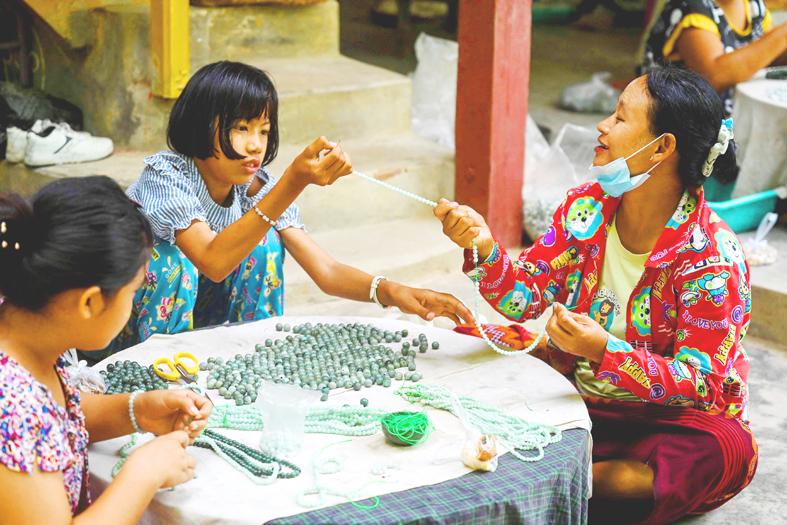Jade traders in Myanmar are running from junta troops and dodging rebel attacks to sell dwindling volumes of the green gemstone, as the billion-dollar industry loses its shine months on from the coup.
The Southeast Asian country has been mired in chaos since the February putsch, with the military trying to crush widespread democracy protests and the economy in crisis.
Fighting around the Hpakant jade mine in northern Kachin State — the largest in the world — has squeezed digging already hampered by the COVID-19 pandemic, cutting supplies of one of the country’s most lucrative exports.

Photo: AFP
Myanmar is the world’s biggest source of jade, with the industry largely driven by insatiable demand for the translucent gem from neighboring China.
Most stones pass through the second city of Mandalay, home to the 23m high Kyauksein Pagoda, a Buddhist shrine built using thousands of kilograms of the precious stone.
Now the complex is quiet, with just a handful of worshippers praying at its gleaming turquoise and red dome.
“Business is not good at all,” said one jade trader, who spent months trying to sell his stones on Mandalay’s roadsides as the pandemic and unrest closed its main jade market.
“Sometimes, people panic when soldiers come patrolling, and they run... If one person runs, others start running. Then soldiers fire warning shots to control the situation,” the trader said.
‘LIVES IN DANGER’
Two days later the market reopened and authorities began collecting fees again — one of the many levied on the gem that finance both sides of a decades-long civil war between armed ethnic groups and the military.
It is “nearly impossible” to purchase Myanmar jade without providing money to the military and its allies, watchdog Global Witness says.
With widespread and often violent resistance against the generals — who regularly appear in public sporting rings set with high-quality jade — working with the stone has taken on a new danger.
“If you continue doing your trading business... We strongly warn that your lives are in danger,” read one notice posted by Generation Z Power, a local dissident group, days before the market reopened.
A bomb exploded near the market a week after the traders returned, and while there were no casualties, the same group promised to set off more if people continue trading there.
Despite the threats, the market is regaining some of its former bustle. Sitting at a small camp table examining a fist-sized rock with a flashlight, one man talks into a smartphone in Mandarin.
Beijing has shuttered its border with Myanmar because of the pandemic and sporadic fighting along the frontier, but demand is still huge — and Chinese buyers are using the unrest to drive a hard bargain.
“Because of COVID and the political situation, they are giving very low price, but we have no choice,” said a 62-year-old dealer who did not want to give his name.
FEAR OF NEXT BLAST
“We need them for the market. If they do not buy or if we do not sell, we have no place to rely on for this business,” he added.
“The price is going down,” said Myo Min Zaw, who also spent his months outside the market traipsing around hotels frequented by Chinese buyers in search of a sale. “A stone worth 10 lakh [US$550] only sells for around 5 lakh nowadays.”
Before the coup, 70 to 90 percent of all jade mined in Hpakant was smuggled to China without ever entering the formal system in Myanmar, says.
Since the putsch, and with fighting flaring around the mines, figures from the shadowy world are even harder to come by, said Hanna Hindstrom, senior campaigner for Myanmar at Global Witness.
“We’ve heard that prices in China have risen as demand is high and supply reduced,” she said — increasing competition between the rebel groups and military-aligned militia who stock the emporiums with high-quality jade.
For Thandar, who runs a small jade bead workshop across the river from Mandalay, selling her modest wares to local customers has just got more dangerous.
“We worry if we have to go to the market,” she said. “We all are afraid of when the blast will come... We cannot avoid going there because of our living.”
A second blast hit the market on Thursday, killing a police officer, local media reported, and sending traders fleeing.
The same day authorities announced that any shop in the complex that failed to reopen by Friday would be “temporarily seized.”
“We are stuck in the middle,” said Aung Aung, using a pseudonym. “The market said they will take the shops if owners do not open. [The Burmese] People’s Defence [Force has] asked us not to do business in the market.”

SETBACK: Apple’s India iPhone push has been disrupted after Foxconn recalled hundreds of Chinese engineers, amid Beijing’s attempts to curb tech transfers Apple Inc assembly partner Hon Hai Precision Industry Co (鴻海精密), also known internationally as Foxconn Technology Group (富士康科技集團), has recalled about 300 Chinese engineers from a factory in India, the latest setback for the iPhone maker’s push to rapidly expand in the country. The extraction of Chinese workers from the factory of Yuzhan Technology (India) Private Ltd, a Hon Hai component unit, in southern Tamil Nadu state, is the second such move in a few months. The company has started flying in Taiwanese engineers to replace staff leaving, people familiar with the matter said, asking not to be named, as the

The prices of gasoline and diesel at domestic fuel stations are to rise NT$0.1 and NT$0.4 per liter this week respectively, after international crude oil prices rose last week, CPC Corp, Taiwan (台灣中油) and Formosa Petrochemical Corp (台塑石化) announced yesterday. Effective today, gasoline prices at CPC and Formosa stations are to rise to NT$27.3, NT$28.8 and NT$30.8 per liter for 92, 95 and 98-octane unleaded gasoline respectively, the companies said in separate statements. The price of premium diesel is to rise to NT$26.2 per liter at CPC stations and NT$26 at Formosa pumps, they said. The announcements came after international crude oil prices

DOLLAR SIGNS: The central bank rejected claims that the NT dollar had appreciated 10 percentage points more than the yen or the won against the greenback The New Taiwan dollar yesterday fell for a sixth day to its weakest level in three months, driven by equity-related outflows and reactions to an economics official’s exchange rate remarks. The NT dollar slid NT$0.197, or 0.65 percent, to close at NT$30.505 per US dollar, central bank data showed. The local currency has depreciated 1.97 percent so far this month, ranking as the weakest performer among Asian currencies. Dealers attributed the retreat to foreign investors wiring capital gains and dividends abroad after taking profit in local shares. They also pointed to reports that Washington might consider taking equity stakes in chipmakers, including Taiwan Semiconductor

STABLE DEMAND: Delta supplies US clients in the aerospace, defense and machinery segments, and expects second-half sales to be similar to the first half Delta Electronics Inc (台達電) expects its US automation business to remain steady in the second half, with no signs of weakening client demand. With demand from US clients remaining solid, its performance in the second half is expected to be similar to that of the first half, Andy Liu (劉佳容), general manager of the company’s industrial automation business group, said on the sidelines of the Taiwan Automation Intelligence and Robot Show in Taipei on Wednesday. The company earlier reported that revenue from its automation business grew 7 percent year-on-year to NT$27.22 billion (US$889.98 million) in the first half, accounting for 11 percent